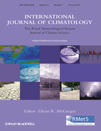
INTERNATIONAL JOURNAL OF CLIMATOLOGY
Scope & Guideline
Exploring the complexities of climate change and variability.
Introduction
Aims and Scopes
- Climate Variability and Change:
Research on the long-term trends and variability of climate parameters such as temperature, precipitation, and extreme weather events, utilizing observational data and climate models. - Regional Climate Studies:
Focused investigations into specific regions' climate characteristics, including the impacts of local geography and climate systems on weather patterns and climate extremes. - Climate Modeling and Simulations:
Development and evaluation of climate models, including the Coupled Model Intercomparison Project (CMIP) phases, to simulate and project future climate scenarios. - Hydroclimate Interactions:
Studies examining the interactions between climate and hydrological processes, including precipitation variability, droughts, floods, and their impacts on water resources. - Extreme Weather Events:
Analysis of the characteristics, frequency, and impacts of extreme weather events such as heatwaves, heavy rainfall, and tropical cyclones, with a focus on their underlying mechanisms. - Climate Impacts and Adaptation:
Research on the implications of climate change for ecosystems, agriculture, water resources, and human health, along with strategies for adaptation and mitigation.
Trending and Emerging
- Machine Learning in Climate Science:
The application of machine learning techniques for climate modeling, data analysis, and prediction is on the rise, offering new ways to handle large datasets and improve predictive accuracy. - Climate Change Impacts on Ecosystems:
Research examining the effects of climate change on biodiversity, ecosystem services, and the resilience of natural systems is gaining traction, highlighting the importance of ecological perspectives in climate science. - Urban Climate Studies:
Investigations into urban heat islands, climate resilience in cities, and the impacts of urbanization on local climates are increasingly prominent, driven by rapid urbanization and the need for sustainable urban planning. - Compound Extreme Events:
Research focusing on the interactions and cumulative impacts of multiple extreme weather events (e.g., heatwaves combined with droughts or floods) is emerging as a critical area of study. - Climate Justice and Social Impacts:
The integration of social science perspectives into climate research, particularly regarding the equitable distribution of climate impacts and adaptation strategies, is gaining importance. - High-Resolution Climate Projections:
Increasing emphasis on high-resolution climate modeling to capture localized climate phenomena and improve the accuracy of climate projections at regional scales.
Declining or Waning
- Historical Climate Reconstructions:
Research focusing on reconstructing past climates using proxy data sources has seen a decrease, possibly due to the growing reliance on advanced modeling techniques and real-time observational data. - Static Climate Classification Systems:
Traditional climate classification schemes that do not incorporate dynamic changes or regional variability are becoming less favored as researchers seek more nuanced and flexible approaches. - Localized Weather Phenomena Studies:
Studies concentrating solely on localized weather events without broader climatic context are diminishing, as there is a stronger push for research that connects local phenomena to global climate trends.
Similar Journals
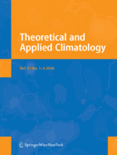
THEORETICAL AND APPLIED CLIMATOLOGY
Elevating Understanding of Climate DynamicsTHEORETICAL AND APPLIED CLIMATOLOGY is a prestigious international journal published by Springer Wien, dedicated to advancing knowledge in the field of climatology and atmospheric sciences. With an ISSN of 0177-798X and an E-ISSN of 1434-4483, this journal serves as a vital platform for researchers and professionals to disseminate essential findings and theoretical advancements in climate studies. Notably ranking in the Q2 category of Atmospheric Science with a Scopus rank of #44 out of 148, it holds a significant 70th percentile position in the field, underscoring its reputation and impact within the academic community. An established publication since 1986, it attracts contributions that explore both theoretical frameworks and applied methodologies, enhancing climate-related policymaking and real-world applications. As a non-open access journal, it provides depth and rigor in its peer-reviewed articles, making it an essential read for anyone engaged in climatology research, whether you are a seasoned expert or an emerging scholar eager to contribute to this dynamic field.
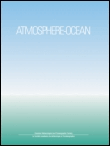
ATMOSPHERE-OCEAN
Illuminating the Dynamics of Our Planet's SystemsATMOSPHERE-OCEAN is a premier peer-reviewed journal published by Taylor & Francis Ltd, dedicated to advancing the fields of atmospheric science and oceanography. Since its inception in 1963, this journal has served as a crucial platform for researchers, professionals, and students, facilitating the dissemination of significant findings and innovative methodologies in understanding the complex interactions between the atmosphere and the ocean. With its journal ranking in the Q3 category for Atmospheric Science and Q2 for Oceanography as of 2023, along with its Scopus rankings, ATMOSPHERE-OCEAN maintains its relevance by addressing current topics such as climate change, hydrology, and ocean circulation patterns. For those seeking to contribute to or stay informed about the latest research in these critical fields, ATMOSPHERE-OCEAN is an invaluable resource that combines rigorous scholarship with practical implications for environmental management and policy.
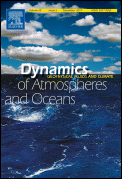
DYNAMICS OF ATMOSPHERES AND OCEANS
Navigating the Complexities of Earth's SystemsDYNAMICS OF ATMOSPHERES AND OCEANS, published by Elsevier, is a renowned journal that has established itself as a vital resource in the fields of atmospheric science, oceanography, and geology. With a rich publication history stretching from 1976 to 2024, this journal provides a platform for high-quality research that addresses the complex interactions between the atmosphere and oceans, which are critical to understanding climate change and environmental systems. It enjoys a respectable impact factor and a reputable position within its category quartiles, specifically noted as Q2 in critical domains such as Computers in Earth Sciences and Oceanography. Researchers and professionals benefit from its indexed coverage, featuring a Scopus ranking that places it among the leading journals in its categories. Although it is not an open-access journal, readers can access its cutting-edge articles through institutional subscriptions or individual purchases. The journal aims to foster cross-disciplinary dialogue and innovation by publishing original research, reviews, and insightful commentary, making it a cornerstone for scholars, students, and practitioners committed to advancing knowledge in the dynamic interplay of Earth's atmospheric and oceanic systems.
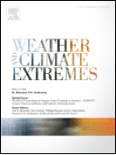
Weather and Climate Extremes
Empowering Knowledge on Climate Variability and PolicyWeather and Climate Extremes is a premier open access journal published by Elsevier, dedicated to advancing the understanding of extreme weather and climate phenomena from 2013 onwards. With an impressive impact factor, this journal ranks in the Q1 quartile across several categories including Atmospheric Science and Geography, Planning and Development, highlighting its significance in the field. The journal serves as a vital platform for researchers, professionals, and students, enabling them to disseminate their findings on climate variability, response strategies, and policy implications. Its accessibility ensures a wide reach, fostering collaboration and innovation while building a comprehensive repository of knowledge to address the challenges posed by climate extremes. The journal’s commitment to quality research is reflected in its Scopus rankings, with top placements across multiple disciplines, signaling its influence in shaping the discourse on climate and ecological management.

Weather and Climate
Connecting Meteorological Minds Across the GlobeWeather and Climate is a prestigious, peer-reviewed journal published by the Meteorological Society of New Zealand, dedicated to advancing knowledge in the domains of meteorology and climatology. With the ISSN 0111-5499, the journal serves as a vital platform for researchers and professionals to disseminate impactful findings that address pressing issues related to weather patterns and climate change. Although it does not operate on an open-access model, it provides a wealth of valuable insights drawn from a diverse range of studies. The significance of this journal in the scientific community is underscored by its commitment to fostering interdisciplinary collaboration and sharing innovative research that can inform policy-making and environmental management strategies. Located in Wellington, New Zealand, Weather and Climate not only contributes to regional meteorological discourse but also holds relevance for the global scientific landscape, making it essential reading for anyone invested in the future of our changing climate.

Idojaras
Cultivating a deeper understanding of our changing atmosphere.Idojaras, a prominent journal published by the Hungarian Meteorological Service, has been a vital contributor to the field of Atmospheric Science since its inception in 1980. With a specific focus on the intricacies of weather phenomena, climate variability, and environmental change, this journal serves as a platform for researchers and professionals to disseminate their findings. Although currently categorized in Q4 of Atmospheric Science with a Scopus rank of #122 out of 148, Idojaras is dedicated to improving its impact and visibility through rigorous peer-reviewed research and comprehensive analyses that engage a global audience. This scholarly publication, which operates without open access, is pivotal for advancing knowledge in meteorological studies, thereby appealing not only to seasoned scientists but also to students and scholars eager to explore this dynamic field. Located in Budapest, Hungary, the journal continues to strive for excellence in its coverage through the convergence of past and present meteorological research, making it a significant resource for anyone interested in the atmospheric sciences.
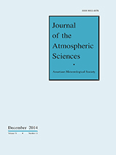
JOURNAL OF THE ATMOSPHERIC SCIENCES
Unveiling the Dynamics of Weather and ClimateJOURNAL OF THE ATMOSPHERIC SCIENCES, published by the American Meteorological Society, stands as a premier resource for the latest research in atmospheric sciences. With an impressive impact factor and a Q1 ranking in the Atmospheric Science category for 2023, this journal is recognized for its rigorous peer-reviewed articles that contribute to the understanding and advancement of weather, climate, and dynamics of the atmosphere. Established in 1969, the journal has maintained high academic standards and delivers valuable insights spanning over five decades, thus catering to an audience of researchers, professionals, and students alike. Although it does not offer open-access options, it provides critical access through various institutional subscriptions, ensuring that significant research findings are disseminated widely within the scientific community. The journal's address is located at 45 Beacon St, Boston, MA 02108-3693, United States, and it accepts submissions and articles until 2024, continuing its legacy of excellence in atmospheric research.

Journal of Southern Hemisphere Earth Systems Science
Exploring Southern Hemisphere Earth Systems for a Sustainable Future.The Journal of Southern Hemisphere Earth Systems Science, published by CSIRO PUBLISHING, stands as a pivotal resource for researchers and professionals in the fields of Atmospheric Science, Global and Planetary Change, and Oceanography. Established in 2016 and operating under an Open Access model since 2019, this journal provides a platform for innovative research and critical discourse on earth systems in the Southern Hemisphere. It has achieved impressive rankings with a Q1 classification across key disciplines and is recognized in Scopus with significant percentile rankings, showcasing its influence and relevance within the scientific community. The journal is dedicated to fostering scholarship that addresses the complex interactions of earth systems, offering valuable insights for those engaged in environmental science and sustainability initiatives. Its commitment to facilitating open access resources makes it an invaluable tool for researchers and students alike, striving to enhance our understanding of global environmental changes.
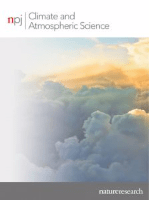
npj Climate and Atmospheric Science
Connecting research to real-world climate solutions.npj Climate and Atmospheric Science, published by NATURE PORTFOLIO, is a premier Open Access journal dedicated to advancing the understanding of climatic and atmospheric phenomena. Since its inception in 2018, this journal has positioned itself as a leader in its field, achieving Q1 ranking in 2023 across key categories such as Atmospheric Science, Environmental Chemistry, and Global and Planetary Change. With a Scopus rank of #23 out of 148 in Earth and Planetary Sciences and a commendable percentile ranking, npj Climate and Atmospheric Science serves as an essential platform for disseminating high-quality research, fostering interdisciplinary collaboration, and addressing critical global challenges. Its open access policy ensures that vital research findings are available to a broad audience, facilitating scholarly engagement and innovation. Researchers, professionals, and students in the fields of environmental science and climate studies will find this journal a valuable resource for cutting-edge studies and transformative insights.
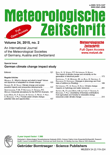
METEOROLOGISCHE ZEITSCHRIFT
Unlocking the Secrets of the AtmosphereMETEOROLOGISCHE ZEITSCHRIFT is a distinguished academic journal dedicated to the field of meteorology and atmospheric sciences, published by E SCHWEIZERBARTSCHE VERLAGSBUCHHANDLUNG. With an ISSN of 0941-2948 and an E-ISSN of 1610-1227, this journal has been an invaluable resource for researchers, professionals, and students since its inception. It has embraced an Open Access model since 2014, promoting wider dissemination of research findings. Based in Stuttgart, Germany, the journal is recognized for its rigorous peer-review process and is currently positioned in the Q3 quartile for Atmospheric Science as per the 2023 category rankings. Additionally, it ranks #97 out of 148 in the Scopus database, placing it in the 34th percentile among Earth and Planetary Sciences. Covering a broad spectrum of topics relevant to meteorology, METEOROLOGISCHE ZEITSCHRIFT serves as a platform for innovative research and theoretical contributions, aiming to advance understanding of atmospheric phenomena and their implications for climate and weather. Researchers and practitioners alike will find valuable insights within its pages, making it a significant asset in the landscape of meteorological scholarship.